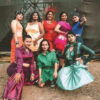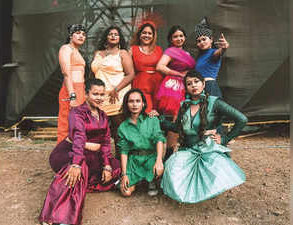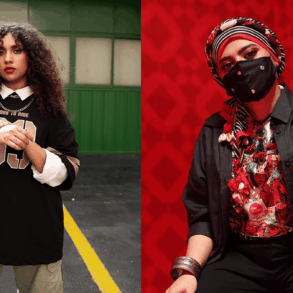On Aug. 11, it’ll mark 50 years since DJ Kool Herc played around on a turntable at his sister’s back-to-school party in the Bronx, breaking, scratching, and rapping over beats and, in the process, birthing the genre now known as hip-hop.
To celebrate this landmark anniversary, artists and institutions alike are unveiling flashy tributes to the once-underground, now widely embraced art form, from a star-studded medley at the Grammys this past February to a hip-hop-themed Criterion Channel lineup, to an upcoming reunion concert at Yankee Stadium. And over on Netflix, the streamer is shining a light on the genre’s ever-expanding yet deeply undervalued community of female rappers, fashion stylists, producers, and journalists with the four-part documentary Ladies First: A Story of Women in Hip-Hop.
Told in a similarly straightforward but engaging format as VH1’s Behind the Music, the docuseries is designed as comprehensive and educational text, charting both the emergence of pioneering femcees like MC Sha-Rock and Roxanne Shanté and the current influx of viral rappers/influencers like Cardi B, Saweetie, and Kash Doll. At any rate, the documentary is more than just a celebratory highlight reel. Narrated by a diverse ensemble of talking heads—including past and present artists, scholars, and other industry professionals—Ladies First examines all of the patriarchal, racial, and economic factors that have contributed to Black women’s marginalization within hip-hop and mainstream culture.
Co-produced by writer and documentarian dream hampton (Surviving R. Kelly) and production designer Hannah Beachler (Black Panther, Moonlight), the series wrestles with a perennial question for Black women across all genres in music: How can women who are so influential in pop culture also be so mistreated and underappreciated? As much as Ladies First relishes in the accomplishments of rap superstars like Missy Elliott, whose quirky innovations have earned her a spot in the Rock and Roll Hall of Fame, or Cardi B, who’s maybe the only former stripper to become a respected voice in politics, it paints an equally bleak portrait of the limits that come with this kind of megawatt success. Interviewees like author Brittney Cooper and archivist Syreeta Gates spend a lot of time highlighting the “ingenuity” of Black female musicians, but what do those achievements mean if they aren’t being rewarded and can easily be mimicked and capitalized on by artists like Iggy Azalea and Miley Cyrus?
This contradiction is mainly addressed in the second and third episodes, titled “What Are They Up Against?” and “What Have They Lost?”. In particular, we see how hyper-visible and bestselling artists like TLC and Megan Thee Stallion have become victims of predatory recording contracts. Drew Dixon, a former director of A&R at Def Jam, explains the pervasiveness of 360 deals, which are contracts that, despite offering artists more financial support and marketing, allow record labels to take a shockingly high percentage of their earnings. Labels screwing over artists is a tale as old as time and prevalent across genres, but in the context of female rap, it’s fair to assume that many of these labels are feeding off artists’ desperation to break through due to a scarcity of opportunities.
The doc also analyzes how sexuality plays into a female rapper’s popularity, but only if it’s presented in a way that’s acceptable and useful to men. The past few years, specifically, have seen a resistance to the subgenre known as “pussy rap,” both from right-wing grifters and stodgy men within the hip-hop community, who ironically have no problem rapping explicit lyrics about female genitalia or employing scantily clad models in their music videos.
With the pressure for women to appear sexy and hyper-feminine to appeal to both male and female audiences comes a crucial conversation about colorism. The recent meteoric rises of artists like Ice Spice, Cardi B, Saweetie, Latto, and Coi Leray have highlighted how being a light-skinned woman is an immediate advantage in the industry, regardless of how musically gifted you are. Meanwhile, skilled artists of darker complexions—like Flo Milli, Chika, and Tierra Whack—are not embraced with the same level of interest. That said, it’s a missed opportunity that none of the light-skinned women interviewed in the doc participate in this conversation.
Additionally, it’s hard not to think of Azealia Banks, another dark-skinned rapper, during this particular conversation. Banks’ career has arguably taken a hit for numerous scandals, all of which pale in comparison to what a C-list male rapper is allowed to get away with. Still, it’s strange how unacknowledged she is in the series, given how she burst onto the scene in the early 2010s with only Nicki Minaj and, regrettably, Iggy Azalea, as true rivals at the time.
Along those lines, the harsh reality of competition among female rappers is disappointingly brushed off in a favor of a more sanitized narrative about sisterhood. Yes, women are stronger together than they are apart, as Queen Latifah notes at one point. But spending some time highlighting historical beefs and diss tracks, many of which were performed by women featured in the docuseries, would’ve made it more amusing and layered. While the doc criticizes respectability politics in regards to sexuality, it also perpetuates that sort of thinking by creating this rosy picture of female camaraderie. It’s certainly hard to imagine that a documentary spotlighting male rappers would ever shy away from this crucial aspect of the genre.
Overall, Ladies First feels largely aimed at Gen Z consumers who may take our current female-populated rap scene for granted, as opposed to the generation that grew up on pioneering acts. The series primarily spotlights stories and anecdotes that have already been tirelessly told, like Drew Dixon’s experiences at Def Jam, which were the subject of the HBO Max documentary On The Record, and former television host Dee Barnes’ assault by Dr. Dre. (She doesn’t even go into detail about the incident in Ladies First, as she’s spoken publicly about it so many times.)
Likewise, the series doesn’t tread new historical territory or extract fresh insights or experiences from its interviewees; rather, it seems more focused on creating a definitive record about where female rappers stand and how far they’ve come. For any young music fanatic trying to understand our current cultural moment, it’s a good start.
This post was originally published on this site be sure to check out more of their content.






